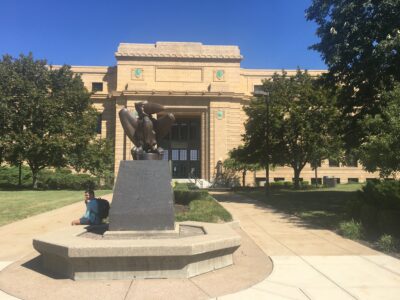Organizers file petition to form a faculty union at KU; leaders of the effort say a ‘strong majority’ has signed union cards

photo by: Kim Callahan/Journal-World
Strong Hall on the University of Kansas campus is pictured in September 2021.
Efforts to form a union to represent the approximately 1,600 members of the University of Kansas faculty and academic staff have taken a big step forward.
Organizers of the union effort — the United Academics of the University of Kansas — announced this week that they have formally filed paperwork with state officials to conduct a union election for faculty and academic staff members at the University of Kansas.
“We need a union to have a voice in major decisions that affect our students’ education. Without a union, we have no say and are at the mercy of decisions made by administrators. Every day, we see what our students and educators need, and the best way to achieve that is for educators and administrators to collaborate at the bargaining table. Great teaching conditions are great learning conditions, and we intend to fight for that,” said Lisa-Marie Wright, an associate teaching professor in the Department of Sociology.
If a simple majority votes to form the union, KU administrators would become obligated to bargain with a union on issues involving wages, benefits, working conditions and a host of other issues that impact faculty or academic staff members.
The group that would be represented by the union includes tenured and tenure-track professors, nontenure-track lecturers and teaching professors, and librarians; the academic staff include research faculty, clinical faculty, curators, scientists and other similar positions, according to union officials.
Organizers said “a strong majority of our colleagues” signed union authorization cards, giving the union confidence that the union vote has a strong chance of being approved.
An election date hasn’t yet been set, but the state’s Public Employee Relations Board is processing the filing and will announce a date. The election will be conducted by secret ballot. Union organizers can campaign to convince employees to vote yes, but others also can create campaigns urging people to vote against union formation.
“It’s UAKU’s hope that the university stays neutral and allows faculty and academic staff to make their own decision about unionization,” said Kate DeJarnette, a clinical assistant professor in the Department of Speech-Language-Hearing.
KU’s administration hasn’t previously taken a position on the union effort, other than to say they “look forward to continued conversations with faculty and instructors about ways to move the university forward.”
The effort to form a faculty union at KU has been underway for several years in various forms. The Journal-World reported in April 2021 about private meetings among faculty members and a group called Kansas Faculty United, which was raising concerns about transparency, shared governance, fairness and truthfulness at KU.
United Academics of the University of Kansas — which is affiliated with the American Federation of Teachers and the American Association of University Professors — publicly announced its union efforts in November.
UAKU leaders in their announcement this week have raised the issue of faculty pay, which they said is leading to “poor recruitment and retention” at KU.
The union efforts come as KU administrators are in the process of evaluating employee pay. The university has undertaken a compensation study to try to determine what positions at the university are currently underpaid compared to the private sector. KU leaders have said they hope to begin making some “market-based” pay adjustments to selected positions in January.
In addition, KU recently gave a 2.5% cost-of-living increase to essentially all university employees. That comes on the heels of a 5% increase the previous year.
KU currently is able to provide raises and make other changes to employee compensation and benefits without collectively bargaining with employees, in most cases. Graduate teaching assistants at KU are represented by a union. That group — which has about 100 dues-paying members, according to information previously provided by KU — agreed to a 5% pay increase last year. That pay increase was consistent with what other KU employees received last year. The two sides had negotiated about 30 times over a 16-month period before reaching the one-year agreement.
While graduate teaching assistants are unionized, KU’s overall faculty has long been a non-unionized group. That’s not the case everywhere. In Kansas, Pittsburg State and Fort Hays State both recently had union contracts for faculty members updated and approved last summer. Johnson County Community College also has faculty members represented by a union.






